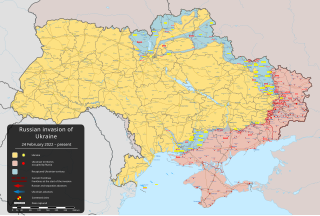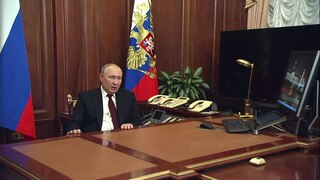
There are currently no diplomatic or bilateral relations between Russia and Ukraine. The two states have been at war since Russia invaded the Crimean peninsula in February 2014, and Russian-controlled armed groups seized Donbas government buildings in May 2014. Following the Ukrainian Euromaidan in 2014, Ukraine's Crimean peninsula was occupied by unmarked Russian forces, and later illegally annexed by Russia, while pro-Russia separatists simultaneously engaged the Ukrainian military in an armed conflict for control over eastern Ukraine; these events marked the beginning of the Russo-Ukrainian War. In a major escalation of the conflict on 24 February 2022, Russia launched a large scale military invasion across a broad front, causing Ukraine to sever all formal diplomatic ties with Russia.
The following lists events that happened in the year 2014 in Ukraine.

The Russo-Ukrainian War is an ongoing war between Russia and Ukraine, which began in February 2014. Following Ukraine's Revolution of Dignity, Russia occupied and annexed Crimea from Ukraine and supported pro-Russian separatists fighting the Ukrainian military in the Donbas war. The first eight years of conflict also included naval incidents, cyberwarfare, and heightened political tensions. In February 2022, Russia launched a full-scale invasion of Ukraine and began occupying more of the country.
The following lists events that happened in 2014 in Russia.

The war in Donbas, or Donbas war, was a phase of the Russo-Ukrainian War in the Donbas region of Ukraine. The war began in April 2014, when a commando unit headed by Russian citizen Igor Girkin seized Sloviansk in Donetsk oblast. The Ukrainian military launched an operation against them. The war continued until subsumed by the Russian invasion of Ukraine in 2022.

The Minsk agreements were a series of international agreements which sought to end the Donbas war fought between armed Russian separatist groups and Armed Forces of Ukraine, with Russian regular forces playing a central part. After a defeat at Ilovaisk at the end of August 2014, Russia forced Ukraine to sign the first Minsk Protocol, or the Minsk I. It was drafted by the Trilateral Contact Group on Ukraine, consisting of Ukraine, Russia, and the Organization for Security and Co-operation in Europe (OSCE), with mediation by the leaders of France and Germany in the so-called Normandy Format. After extensive talks in Minsk, Belarus, the agreement was signed on 5 September 2014 by representatives of the Trilateral Contact Group and, without recognition of their status, by the then-leaders of the self-proclaimed Donetsk People's Republic (DPR) and Luhansk People's Republic (LPR). This agreement followed multiple previous attempts to stop the fighting in the region and aimed to implement an immediate ceasefire.
Many states and international organisations reacted to the war in Donbas, a phase of the Russo-Ukrainian War that took place from 2014 to 2022 in the Donbas historical region in eastern Ukraine.

Decommunization in Ukraine started during the dissolution of the Soviet Union in 1991 and expanded afterwards. Following the 2014 Revolution of Dignity and beginning of the Russo-Ukrainian War, the Ukrainian government approved laws that banned communist symbols, as well as symbols of Nazism as ideologies deemed to be totalitarian. Along with derussification in Ukraine, it is one of the two main components of decolonization in Ukraine.

Russian irredentism refers to territorial claims made by the Russian Federation to territories that were historically part of the Russian Empire and the Soviet Union, which Russian nationalists refer to as the "Russian world". It seeks to politically incorporate ethnic Russians and Russian speakers living in neighbouring territories outside Russia's modern-day borders. This ideology has been significantly defined by the regime of Vladimir Putin, who has governed the country since 1999.

From April 2014 until September 2022, the Donetsk People's Republic (DPR) and the Luhansk People's Republic (LPR) claimed to be independent states. Their sovereignty was recognized by South Ossetian authorities in 2014, Russia and Abkhazian authorities in February 2022, Syria in June 2022 and North Korea in July 2022.
Events in the year 2021 in Ukraine.

In March and April 2021, prior to the 2022 Russian invasion of Ukraine, the Russian Armed Forces began massing thousands of personnel and military equipment near Russia's border with Ukraine and in Crimea, representing the largest mobilisation since the illegal annexation of Crimea in 2014. This precipitated an international crisis due to concerns over a potential invasion. Satellite imagery showed movements of armour, missiles, and heavy weaponry towards the border. The troops were partially withdrawn by June 2021, though the infrastructure was left in place. A second build-up began in October 2021, this time with more soldiers and with deployments on new fronts; by December over 100,000 Russian troops were massed around Ukraine on three sides, including Belarus from the north and Crimea from the south. Despite the Russian military build-ups, Russian officials from November 2021 to 20 February 2022 repeatedly denied that Russia had plans to invade Ukraine.
Many states, international organizations, and civil society actors worldwide had expressed their reactions to the then-escalating crisis between Russia and Ukraine that started in March 2021. The crisis eventually culminated in a Russian invasion of Ukraine, beginning on 24 February 2022.

On 24 February 2022, Russia invaded Ukraine in an escalation of the Russo-Ukrainian War that started in 2014. The invasion became the largest attack on a European country since World War II. It is estimated to have caused tens of thousands of Ukrainian civilian casualties and hundreds of thousands of military casualties. By June 2022, Russian troops occupied about 20% of Ukraine. From a population of 41 million, about 8 million Ukrainians had been internally displaced and more than 8.2 million had fled the country by April 2023, creating Europe's largest refugee crisis since World War II. Extensive environmental damage caused by the war has been widely described as an ecocide. War-related disruption to Ukrainian agricuture and transport contributed to a food crisis worldwide.
On 24 February 2022, Russia launched a military invasion of Ukraine in a steep escalation of the Russo-Ukrainian War. The campaign had been preceded by a Russian military buildup since early 2021 and numerous Russian demands for security measures and legal prohibitions against Ukraine joining NATO.

"On conducting a special military operation" was a televised broadcast by Russian president Vladimir Putin on 24 February 2022, announcing the Russian invasion of Ukraine.

"Address concerning the events in Ukraine" was a televised address by Russian President Vladimir Putin on 21 February 2022, announcing that the Russian government would recognise the Ukrainian separatist regions of the Donetsk People's Republic and the Luhansk People's Republic as independent. During the speech, Putin also made a number of claims regarding Ukrainian history and Ukrainian domestic politics. The speech, which marked a significant escalation in the culminating Russo-Ukrainian crisis, was followed three days later by another speech declaring "a special military operation" in Ukraine—announcing the Russian invasion of Ukraine.

The United States has supported Ukraine during the ongoing Russian invasion of Ukraine. After it began on 24 February 2022, President Biden condemned the invasion, provided military and humanitarian aid to Ukraine, and sanctioned Russia and Belarus, the two countries most involved in invading Ukraine.

The Zeitenwende speech was an address delivered to the Bundestag by Olaf Scholz, the Chancellor of Germany, on 27 February 2022. His speech was a reaction to the 2022 Russian invasion of Ukraine on 24 February. Scholz described the attack as a "historic turning point" and announced that in response his government would use a €100 billion fund to significantly increase military spending, reversing Germany's previously cautious defence policy.

The following outline is provided as an overview of and topical guide to the Russo-Ukrainian War:












